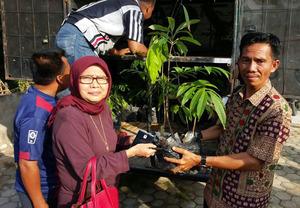Scientists from the University of Göttingen call for meaningful support for smallholder farmers in Indonesia

Credit: Miriam Romero
The growing global demand for palm oil has led to a rapid spread of oil palm monoculture plantations in South East Asia. This is often associated with the loss of natural habitat and biodiversity. Oil palm monocultures are uniformly structured and therefore offer little space for different species. Diversification using indigenous tree species can contribute to maintaining biodiversity. A research team from the University of Göttingen (Germany) and the University of Jambi (Indonesia) has now shown that such diversification can be encouraged with the help of information campaigns and free seedlings. The study has been published in the Journal of Environmental Economics and Management.
Oil palm plantations cultivated by smallholder farmers account for about 40 percent of the total area of oil palms in Indonesia, which means they are an important target group for interventions. The study of the interdisciplinary German-Indonesian Collaborative Research Centre “EFForTS” involved 800 smallholder farmers. “Smallholder farmers have little access to information, advice and high-quality seeds,” says study director Professor Meike Wollni, agricultural economist at the University of Göttingen. “Yet, there is a high level of interest in diversification, especially with native fruit trees, as expressed by the local population in focus group discussions.”
Against this background, the researchers divided the participants in the study into different treatment groups. The groups received information and/or tree seedlings. The results show that the two measures being investigated increase the number of trees planted in smallholder oil palm plantations. “We see that both interventions motivate a small group of individuals to plant many trees,” says first author Dr Katrin Rudolf from the University of Göttingen. “However, to reach a large number of farmers, it is necessary to distribute seedlings. Here, the farmers’ preferences should be taken into account when selecting tree species in order to increase the tree survival.”
Identifying policies to improve the environmental impact of oil palm cultivation is highly relevant in the context of ongoing species loss, according to the authors. In addition to the supply side, however, the demand side should be considered when designing policies. Consumers could, for example, contribute to the costs incurred through certification of more environmentally friendly plantations.
###
Original publication:
Rudolf, K., Romero, M., Asnawi, R., Irawan, B. und Wollni, M. (2020): Effects of information and seedling provision on tree planting and survival in smallholder oil palm plantations. Journal of Environmental Economics and Management, 104, 102361, https:/
Contact:
Professor Meike Wollni
University of Göttingen
Faculty of Agricultural Sciences – Environmental and Resource Economics
Platz der Göttinger Sieben 5, 37073 Göttingen, Germany
Tel: +49 (0) 0551 39-24843
Email: [email protected]
http://www.
Media Contact
Melissa Sollich
[email protected]
Original Source
https:/
Related Journal Article
http://dx.




